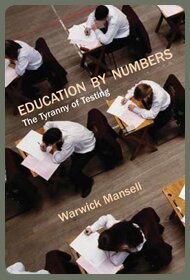I recently gave a speech to a meeting of the “Anti-Sats” campaign. The text follows below:
I wrote my book from a simple perspective. I was trying to imagine myself as the parent of a child going through the current English education system. Then I considered all the evidence I had amassed on the impact of the test-based accountability regime on pupils’ learning experiences to answer what I thought was the fundamental question: would it help or hinder my hypothetical child in acquiring the kind of education I would want for them?
The sub-title of the book: “The Tyranny of Testing”, says it all about the conclusions I reached. I had a fairly good idea about where the book was heading when I started to write it, having come across, in my day job as testing specialist at the TES over a period of around two years, evidence almost daily as to the damage the system was doing.
But I was astonished, during 18 months of finalising my research and writing the book, to find not a single convincing, detailed argument coming from the other perspective, in other words suggesting persuasively that the current arrangements were actually helping support good teaching. I have still to hear one.
In my opinion, any campaign on KS2 testing has to keep this simple question at the forefront. Is the testing regime and the apparatus of league tables, targets, Ofsted inspections and performance pay which rests on it, helping or hindering learning?
Now let’s consider some of the thinking behind the Government’s decision last month to scrap the Key Stage 3 tests.
Ministers argue that testing at KS3 is not so essential for school-by-school accountability, since GCSEs, A-levels and other end-of-school exams can perform that function.
By contrast, key stage 2 tests are vital, it is said, to provide information on each school’s performance. Therefore, they must stay.
The upshot of this is that, in the Government’s eyes the need for accountability of this particular type trumps any educational arguments that might pertain at key stage 2. Effectively, it says that accountability concerns outweigh any consideration of the impact of this apparatus on the child. Accountability of this sort has to stay, even if the evidence shows that, on balance, it has a detrimental effect on a child’s education.
I think, as should be fairly obvious, that this is to get the argument fundamentally the wrong way around.
Accountability is important. Billions are invested in education and clearly there has to be some way of checking on the effectiveness of the spending. Any revision of that carries risks for the politician.
But if the operation of the accountability regime is damaging pupils’ learning – and there is mountains of evidence that, in many cases, this is clearly happening – then education must be the prime consideration and the accountability structure must be reformed. The needs of children, rather than politicians, must be to the fore.
It remains astonishing to me that, not only is this not happening at key stage 2, but ministers are not even investigating in any detailed way the impact of teaching to the test.
This is precisely what happened in Wales, with a fair-minded inquiry led by a leading independent academic, which eventually led to the scrapping of English-style national tests there. Such an investigation would be the obvious first stage for any Government genuinely concerned to look at this matter afresh and with pupils’ interests to the fore, although one could argue that that is hardly necessary, given the weight of material already in the public domain.
Actually, there is a very small-scale inquiry going on presently. Barely noticed in last month’s announcement on Key Stage 3, the Government said it was setting up an “expert group” to consider the issue of teaching to the test at key stage 2, but only in the sense of investigating how to encourage schools not to teach to the test. I can suggest several facetious responses, but I am sure those at the chalkface might have some better ones. More seriously, I would urge people to investigate making representations on their concerns about test-driven schooling to this group.
- Warwick Mansell
No Comments
posted on November 21st, 2008
